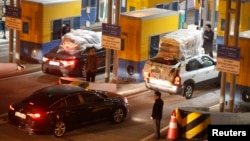North Korea stands to lose tens of millions of dollars a year if it closes the Kaesong industrial complex, a key source of hard currency for its troubled economy.
The eight-year-old factory complex that Pyongyang jointly operates with South Korea is the last remaining direct economic tie between the two Koreas.
The 123 South Korean companies at the facility, 10 kilometers north of the demilitarized zone separating North and South, employ 53,000 North Koreans, with the communist government taking a significant portion of the workers' salaries of about $110 a month.
The Washington D.C.-based Peterson Institute for International Economics estimates the zone yields the North about $90 million a year in wages, rents, fees and taxes - in hard cash.
Former U.S. State Department official Mitchell Reiss said he doubts North Korea intends to permanently close the facility.
"I think the zone is too important for them to shut down permanently, but as a tactic I think they tried to make a move since their previous moves had not succeeded in intimidating South Korea, the United States and others," he said.
Reiss said South Korean President Park Geun-hye's tough response to Pyongyang's brinksmanship surprised the North Koreans.
"I think what happened is that they were taken a little bit by surprise when President Park decided not to play this game, but in fact, to escalate and end it by withdrawing all of the South Korean workers," he said.
Reiss described the potential economic impact on South Korea for closing the facility as minimal.
Seoul's total estimated investment in the zone is about $840 million, with $350 million of that in infrastructure and the remainder in the factories and equipment. The South would be forced to write this off in the event of a permanent closure.
The Peterson Institute says the costs would be larger, however, citing estimates as high as $5.5 billion, resulting from the potential bankruptcies of South Korean companies located in the zone.
Last year Kaesong produced $470 million worth of textiles, automotive parts and wiring for household appliances.
About 800 South Koreans worked at the complex, but earlier this month North Korea blocked further South Korean access to it, which forced some of the companies to suspend their operations when they could no longer transport fuel, food and raw materials from South Korea.
The North has previously closed the crossing, but in the past has reopened it after a few days.
The eight-year-old factory complex that Pyongyang jointly operates with South Korea is the last remaining direct economic tie between the two Koreas.
The 123 South Korean companies at the facility, 10 kilometers north of the demilitarized zone separating North and South, employ 53,000 North Koreans, with the communist government taking a significant portion of the workers' salaries of about $110 a month.
The Washington D.C.-based Peterson Institute for International Economics estimates the zone yields the North about $90 million a year in wages, rents, fees and taxes - in hard cash.
Former U.S. State Department official Mitchell Reiss said he doubts North Korea intends to permanently close the facility.
"I think the zone is too important for them to shut down permanently, but as a tactic I think they tried to make a move since their previous moves had not succeeded in intimidating South Korea, the United States and others," he said.
Reiss said South Korean President Park Geun-hye's tough response to Pyongyang's brinksmanship surprised the North Koreans.
"I think what happened is that they were taken a little bit by surprise when President Park decided not to play this game, but in fact, to escalate and end it by withdrawing all of the South Korean workers," he said.
Reiss described the potential economic impact on South Korea for closing the facility as minimal.
Seoul's total estimated investment in the zone is about $840 million, with $350 million of that in infrastructure and the remainder in the factories and equipment. The South would be forced to write this off in the event of a permanent closure.
The Peterson Institute says the costs would be larger, however, citing estimates as high as $5.5 billion, resulting from the potential bankruptcies of South Korean companies located in the zone.
Last year Kaesong produced $470 million worth of textiles, automotive parts and wiring for household appliances.
About 800 South Koreans worked at the complex, but earlier this month North Korea blocked further South Korean access to it, which forced some of the companies to suspend their operations when they could no longer transport fuel, food and raw materials from South Korea.
The North has previously closed the crossing, but in the past has reopened it after a few days.












